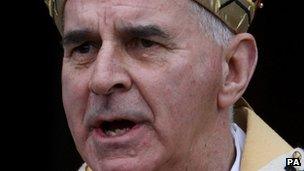Cardinal Keith O'Brien urges Christians to 'proudly' wear cross
- Published
- comments

Cardinal Keith O'Brien is the leader of the Roman Catholic Church in Scotland
Britain's most senior Roman Catholic Church cleric has called for Christians to wear a cross every day.
In his Easter Sunday sermon, Cardinal Keith O'Brien will tell worshippers to "wear proudly a symbol of the cross of Christ" each day of their lives.
The leader of the Church in Scotland, he will voice concern at the growing "marginalisation" of religion.
His comments come as a case is going to the European Court of Human Rights to allow employees to wear crosses.
In his Easter message, Cardinal O'Brien is expected to refer to remarks made by Pope Benedict XVI in 2010 that Christians "need to be free to act in accordance with their own principles".
Former nurse Shirley Chaplin, from Exeter, and Nadia Eweida, from Twickenham, who worked with British Airways, are taking their call for all employees to be able to wear a cross at work to the European Court of Human Rights.
Both women lost their discrimination cases in 2010.
An appeal court judgment upheld the Employment Appeal Tribunal's finding that banning Ms Eweida from wearing a cross was not discriminatory because Christians "generally" do not consider wearing a cross as a requirement of their religion.
'Increasing marginalisation'
Cardinal O'Brien will say in his Easter Sunday homily at St Mary's Cathedral in Edinburgh that many people wear crosses "not in any ostentatious way, not in a way that might harm you at your work".
He will say: "Just 18 months ago, Pope Benedict XVI stood in Westminster Hall in London addressing a vast audience of politicians, diplomats, academics and business leaders.
"There he clearly stated that 'religion is not a problem for legislators to solve, but a vital contributor to the national conversation'.
"In this light, I cannot but voice my concern at the increasing marginalisation of religion, particularly Christianity, that is taking place in some quarters."
The cardinal, who is the Archbishop of St Andrews and Edinburgh, hopes increasing numbers of Christians will adopt the practice of wearing a cross in a "simple and discreet" way as a symbol of their beliefs.
A lapel pin costs £1 - less than a chocolate Easter egg - and could be given as gifts, he will say.
Mrs Chaplin is being represented by the Christian Legal Centre.
Andrea Williams, its director, said it was "time for Christians everywhere to mark their allegiance to the cross".
"I very much hope that in Europe there will be vindication for Shirley Chaplin," she said, adding that she hoped "some sort of common sense will prevail".
A Home Office spokesman said: "People should be able to wear crosses. The law allows for this, and employers are generally very good at being reasonable in accommodating people's religious beliefs."
The government says UK law "strikes the right balance" between employees' rights to express their beliefs at work and the requirements of employers.
The law, and its application in the workplace, centres on article nine of the European Convention of Human Rights.
The legislation backs an individual's freedom to act in accordance with religious beliefs but also recognises limitations "in the interests of public safety, for the protection of public order, health or morals, or for the protection of the rights and freedoms of others".
Shami Chakrabarti, director of Liberty, said Britain had a strong tradition of freedom of expression and tolerance.
China address
She said: "It seems to me from a freedom of conscience point of view, from a freedom of expression point of view, you should be able to express yourself as long as you can do your job and as long as you are not harming anyone else.
"So of course, no-one would say a brain surgeon should be able to wear a cross dangling over a patient in a sterile theatre but equally you should not ban symbols just because people don't agree with them."
Meanwhile, the Moderator of the General Assembly of the Church of Scotland will deliver his Easter address from China.
The Right Reverend David Arnott is visiting Church of Scotland projects in Yunnan Province.
He will tell worshippers: "The world changes at Easter. The days lengthen, the flowers, long-hidden, bloom in riots of colour and the very air, hopefully, feels that bit warmer. There is a sense of hope all around.
"It is that sense of hope that emerges from the darkness of a tomb, which underpins the faith of the church."